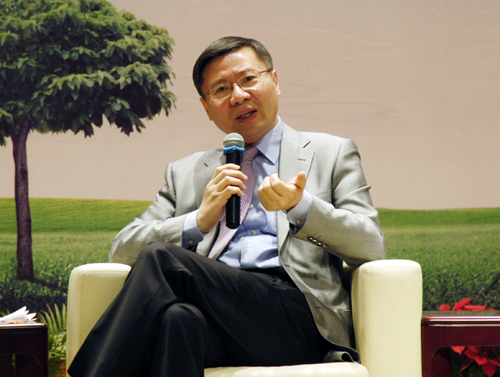The rise of China's political soft power
- By Zhang Weiwei
 0 Comment(s)
0 Comment(s) Print
Print E-mail China.org.cn, September 4, 2012
E-mail China.org.cn, September 4, 2012
 |
|
Renowned scholar Zhang Weiwei [File photo] |
We often say that China's hardware has become increasingly sophisticated, but our software is backward. But does this mean that our software had nothing to do with the development of our hardware?
Indeed, the philosophies behind China's rapid development, such as "being practical and realistic" and "being harmonious yet remaining different" have helped China to be able to effectively cope with serious challenges.
Due to these guiding philosophies as well as strategic decision-making, the development of the country's infrastructure, including the construction of highways and airports has made rapid progress. But more importantly, the philosophies have guided the country through tremendous struggles. How else would China be able to lift more than 400 million people out of poverty? How else was China able to avoid the Asian financial crisis in 1997 and the great recession of 2008? How else did China successfully get through its five-year transitional period to become the world's largest exporter? How else would China have organized the world's most unforgettable Olympic Games and Expo?
For all of the above questions, China's soft power has been a guiding light. "Soft power" does not only include cultural items like martial arts and Chinese food, but also political soft power, political values and China's governance model.
As China plays an increasingly significant role in the world, its soft power must be attractive both domestically as well as internationally. The world faces many difficulties, including widespread poverty, international conflict, the clash of civilizations and environmental protection. Thus far, the Western model has not been able to decisively address these issues; the China model therefore brings hope that we can make progress in conquering these dilemmas.
Poverty and development
The Western-dominated global economic order has worsened poverty in developing countries. Per-capita consumption of resources in developed countries is 32 times as large as that in developing countries. Almost half of the population in the world still lives in poverty. Western countries nevertheless still are striving to consolidate their wealth using any and all necessary means. In contrast, China forged a new path of development for its citizens in spite of this unfair international order which enabled it to virtually eliminate extreme poverty at home. This extensive experience would indeed be helpful in the fight against global poverty.
War and peace
In the past few years, the American model of "exporting democracy'" has produced a more turbulent world, as the increased risk of terrorism threatens global security. In contrast, China insists that "harmony is most precious". It is more practical, the Chinese system argues, to strengthen international cooperation while addressing both the symptoms and root causes of terrorism.
The clash of civilizations
Conflict between Western countries and the Islamic world is intensifying. "In a world, which is diversified and where multiple civilizations coexist, the obligation of Western countries is to protect their own benefits yet promote benefits of other nations," wrote Harvard University professor Samuel P. Huntington in his seminal 1993 essay "The Clash of Civilizations?". China strives for "being harmonious yet remaining different", which means to respect other nations, and learn from each other. This philosophy is, in fact, wiser than that of Huntington, and it's also the reason why few religious conflicts have broken out in China. China's stance in regards to reconciling cultural conflicts, therefore, is more preferable than its "self-centered" Western counterargument.
Environmental protection
Poorer countries and their people are the most obvious victims of global warming, yet they are the least responsible for the emission of greenhouse gases. Although Europeans and Americans have a strong awareness of environmental protection, it is still hard to change their extravagant lifestyles. Chinese environmental protection standards are not yet ideal, but some effective environmental ideas can be extracted from the China model.
Perfecting the China model
The China model is still being perfected, but its unique influence in dealing with the above four issues grows as China becomes stronger. China's experiences in eliminating poverty, prioritizing modernization while maintaining traditional values, and creating core values for its citizens demonstrate our insight and sense of human consciousness.
Indeed, the success of the China model has not only brought about China's rise, but also a new trend that can't be explained by Western theory. In essence, the rise of China is the rise of China's political soft power, which has significantly helped China deal with challenges, assist developing countries in reducing poverty, and manage global issues. As the China model improves, it will continue to surprise the world.
(The article was published in Chinese and translated by Gong Yingchun.)
Opinion articles reflect the views of their authors, not necessarily those of China.org.cn.






Go to Forum >>0 Comment(s)